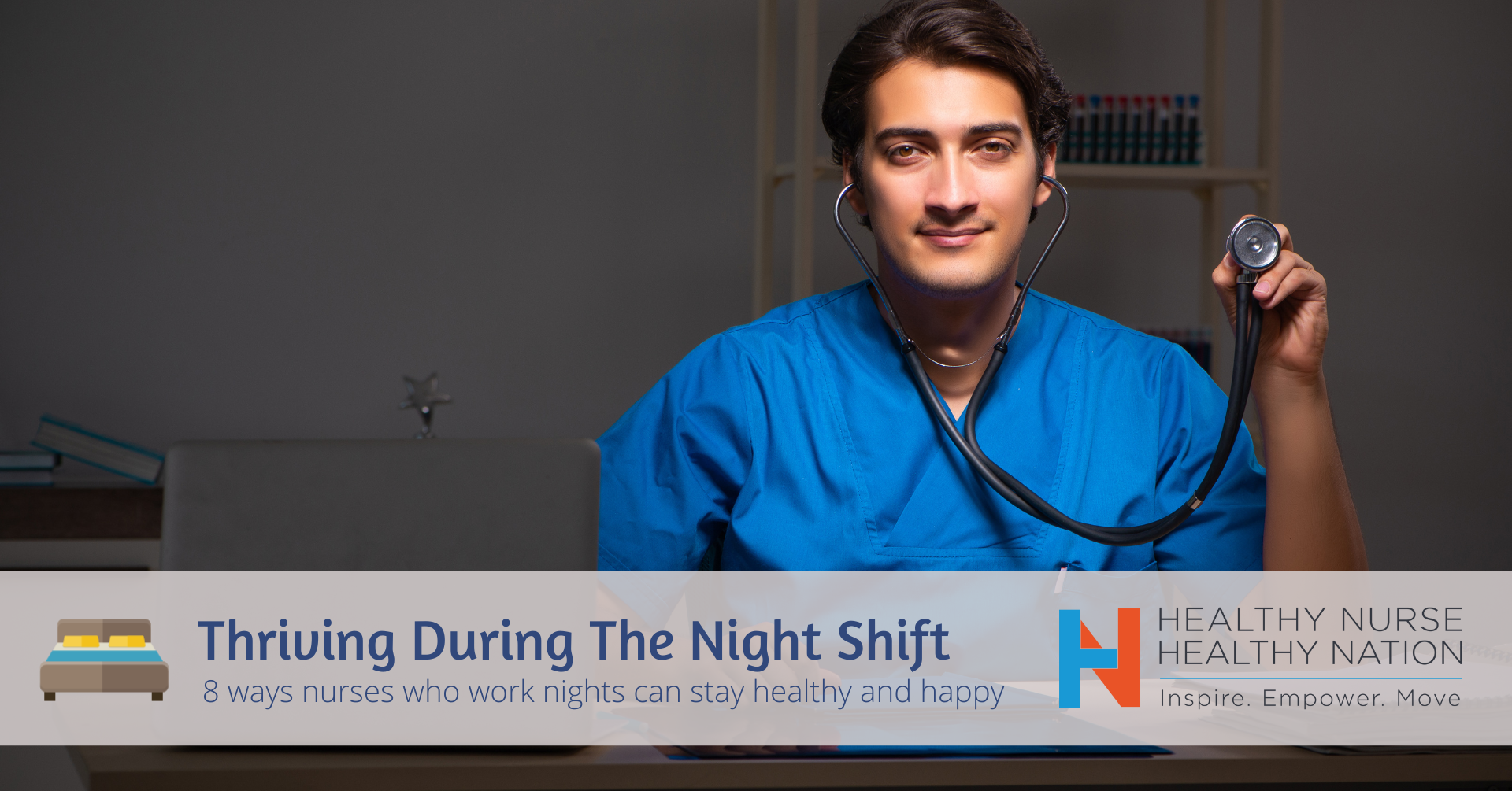Healthy Nurse, Healthy Nation™ Blog - Thriving During The Night Shift
Published
Nurses who work overnight face unique issues. In fact, The National Sleep Foundation reports that overnight shift workers are more likely to suffer from heart disease, weight issues, and may even have more common colds than daytime workers. These issues may stem from a lack of the overall amount of sleep, not being able to spend quality time with friends and family, or unhealthy eating habits that people may adopt when trying to stay awake.
Here are some strategies to help you avoid the common pitfalls of working nights.
Make sleep a priority
The National Sleep Foundation recommends that adults get 7 to 9 hours of sleep per night. As a night shift worker, it can be tempting to sleep for a few hours after your shift and then to start tackling your home and family to-do list before you head back to the hospital. Instead, make sure you sleep enough so that you are fully rested when you return to work the next day. A lack of sleep can lead to depression, errors at work, and myriad health problems.
Invest in sleep supporters
Many night shifts begin at 11 p.m. and finish at 7 a.m., which means you’ll be trying to sleep in the morning and early afternoon. Room-darkening shades can help you fall asleep faster by mimicking a nighttime environment. If you have other people in your home or live in a noisy area, earplugs or a white-noise machine may also help you nod off more quickly – and help you stay asleep. Here are more tips to help you Fall Asleep Faster after a shift.
Monitor your medication
Always talk to your health care provider about any medication and/or supplements that you’re taking. They may make you drowsy or stimulate you. You’ll want to time your doses appropriately for your sleep schedule, with your health care provider's approval.
Be mindful of caffeine
Caffeinated beverages like coffee and tea can help you stay awake if you’re getting sleepy during your shift. However, caffeine can stay in your system for hours. So, if you’re nearing the end of your work period, it may be best to avoid it because the caffeine may help prevent you from drifting off to a restful sleep once you get home.
Ensure you’re alert enough to drive home
Sometimes after a night shift, you may be ready to doze off immediately. But you still have to get safely home. Always take stock of how you’re feeling before getting in your car. If you need to, call a family member, friend, or a ride-sharing service to pick you up or take public transportation. Many hospitals have rooms where staffers can get some sleep, so use them if needed.
Make breaks as restful as possible
When you take a break during your shift, make sure it’s a time of true renewal. If your employer allows it, consider taking a catnap. The National Sleep Foundation says most experts recommend between five and twenty minute naps for specific situations and people. That’s the ideal amount of shut-eye to ward off grogginess and still give you the benefits of improved alertness and a better mood. You can also stretch, sit in a quiet place, or practice a restorative form of yoga called yoga nidra to help you feel refreshed upon returning to work.
Eat healthy meals and snacks
At night, it may be tempting to eat junk food or sugary candy to help you stay awake, but those snacks will often make you feel worse. Instead, focus on eating a healthful diet with plenty of nutritious snacks during your shift. Try some of these Healthy Make-Ahead Meals for Busy Nurses.
Schedule quality time
Many night shift nurses may feel like they’re missing out on family events or time with friends. If you work overnight, make sure to schedule fun activities or get-togethers with loved ones, so you can maintain those relationships.
What other tips do you have for thriving during the night shift? Share them in our discussion or on Facebook.
Find this helpful? Consider sharing it with a friend by clicking on the social media icons on the left side of this page. Don't forget to tag us with #HealthyNurse. Find us on Facebook, Twitter, or Instagram.

Have you joined the Healthy Nurse, Healthy Nation (HNHN) Grand Challenge yet?
Sign up for our monthly challenges here!
Source List:
Peri, C. 10 Things to Hate About Sleep Loss. February 13, 2014. Retrieved July 14, 2018.
Survival Tips for Nurses Working the Night Shift. Retrieved July 16, 2018.
Reviewed and edited 12/6/22
Blog Rest
08/27/2018 1:13pm CDT



Post a Comment or Question